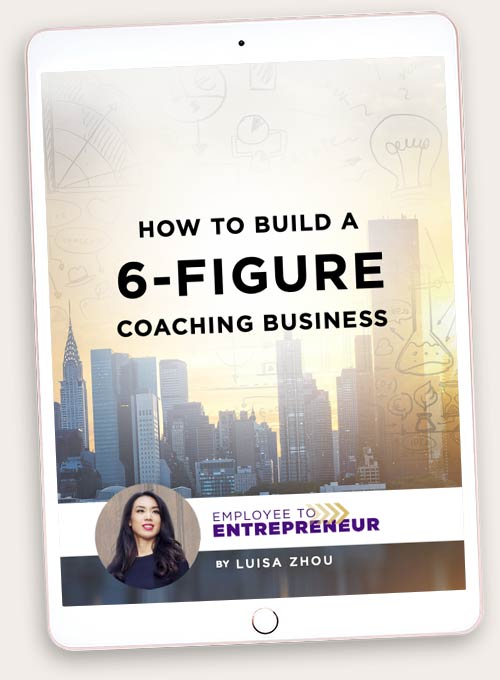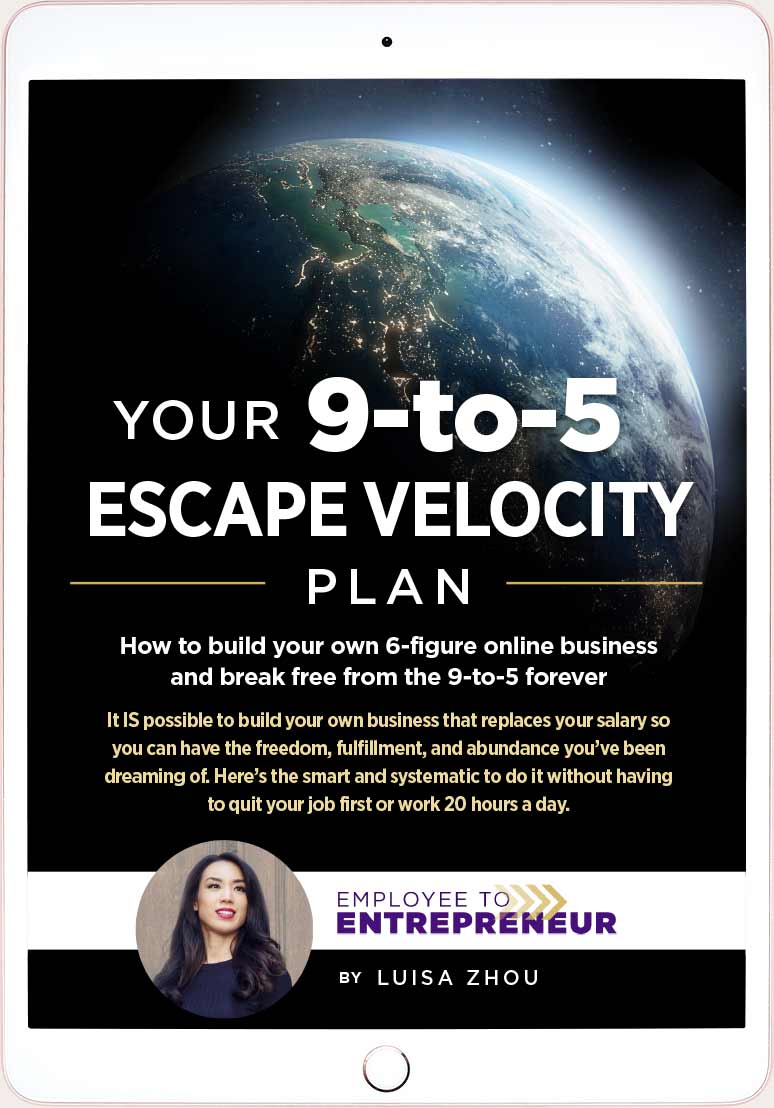Want to learn how to become a fertility coach?
Then you’re in the right place. Starting a fertility coaching business can be a great way to create freedom, income, and impact. And today, you’ll learn the steps to start your own business.
Want to learn more? Read on!
What is fertility coaching?
First things first. What is a fertility coach?
A fertility coach supports their clients in their journey to becoming a parent, whether that happens through unassisted conception, assisted reproductive technology, or adoption.
Fertility coaching is a massively impactful niche. Your coaching business not only changes your clients’ lives, but it also gives you the life of freedom, flexibility, and control you’ve been dreaming of.
But how in demand are fertility coaches? That’s what we’ll look at next.
Are fertility coaches in demand?
Yes, fertility coaches are in demand. The fertility market is estimated to grow to a $47.9 billion market by 2030, which shows that people are willing to spend money in this niche. People spend thousands of dollars on things like fertility tracking, egg freezing, IVF treatments, and more.
And coaching as a service is popular—and impactful. 95% of clients rate their coaches as “good” or “excellent.” The number of coaches is also increasing rapidly.
So as you can see, fertility coaching can help you make a big difference. But can you build a profitable business as a fertility coach? That’s what we’ll look at next.
How much does a fertility coach charge?
According to the ICF Global Coaching Study, the average fertility coach salary is $62,500. However, you can make a lot more, just like many of my students (some of them fertility coaches), who make six figures and multiple six figures.
It all comes down to your goals and the type of business you want to build. You don’t need to choose; you can build a massively profitable business, create an amazingly flexible schedule, and have a lasting impact.
That said, building a six-figure business takes work. But not JUST hard work. There’s also resilience, creativity, resourcefulness…and I’m sure I’m missing a few other popular runner-ups.
But if the benefits of running your own business outweigh the downsides for you, take a look at this short video on how to build a six-figure coaching business:
Now, who is qualified to become a fertility coach? That’s what we’ll look at next.
Who is qualified to become a fertility coach?
A fertility coach can be someone who supports their clients in choosing the right medication or treatment method, but not necessarily.
As you know, fertility is so much more. A fertility coach can be someone who helps their clients feel less anxious or stressed, improve their mindset, or visualize or prepare their clients for getting pregnant or adopting. Fertility coaches can also help their clients with their nutrition to improve their health and fertility.
In other words, there are various types of fertility coaches. Some of them have medical degrees, some nursing degrees, and some are registered nutritionists. That said, it goes without saying that your students need to consult a general practitioner for tailored medical advice and prescriptions.
Ultimately, to become a fertility coach, your experience is what matters and you don’t need a certification to get started. (Note: if you provide certain health-related advice, you DO need a certification and you need to be aware of any regulations that apply in your specific situation.)
If you can show that you have gotten results and/or you’ve helped others get results and then you help your clients get results, that’s ultimately what your clients will care about.
Get the Ultimate Guide
for building a
6-Figure Coaching Business so you can achieve more freedom!
Also, note that the coaching certification industry isn’t regulated. So even if you pay thousands and spend months on a program, you’re not necessarily working towards a very well-established certification.
In that case, your best bet is to get a certification in the area you want to focus on (nutrition, health…) and get that certification from a reputable organization or university. For instance, there are several great universities offering nutrition certification (such as the University of Pennsylvania or Cornell University).
At the same time, you can get the same experience as you’d get from a certification program by working with your first few clients at a lower rate than you will later on, when you’re more established. That way, you build your skills as a coach while your clients get to work with you for less than they normally would.
That’s it, now you know what a fertility coach is. But how do you become one? AKA how do you find a niche, get clients, start your business? Let’s have a look.
How to become a fertility coach
What does it take to build your fertility coaching business?
In this chapter, you’ll learn how to find your niche, create a coaching offer, get your first paying clients, and grow your email list so that you can create a thriving fertility coaching business.
Let’s start with your niche.
Find your niche
When you’re just starting out, it’s not enough to say, “I’m a fertility coach.” That’s because it’s too broad. Who are you coaching? How do you help them?
As we established above, there are tons of different types of fertility coaches, so you need to niche down and specify who you serve.
You can do so by filling in the gaps in this sentence:
“I help (who) get (what) by (why you).”
So, “I help 30-something women boost their fertility by eating the right nutrition.”
With this, your audience doesn’t just see you as a fertility coach among many, but as someone who can help THEM in their specific situation.
If you want to know more about picking a niche, take a look at this short video where I show you the exact steps:
Create a coaching offer
You also need a coaching package.
Your coaching offer needs to be of the right length, have the right price, and focus on the right goal.
Your coaching package
Fortunately, your coaching package can follow a really simple formula. Offer a three-month package at $1,500.
During those three months, you meet with your students weekly and in between your calls, you work with them through whatever medium you choose (email, Voxer, WhatsApp, Slack or something else).
This package comes with a few benefits…
First, your offer is priced low enough so that it’s easy to say yes to. (Before you’ve learned how to sell.)
Second, three months is a very specific timeframe. Your coaching package has a clear and precise goal and it’s long enough to get that result they’re paying you for.
However, it’s not too long. You don’t want to be working with your first client for six months or a year because… what if you don’t like them? Or you realize you’ve taken on too much and can’t really deliver that much in the timeframe you’ve promised? Or you want to change niches?
Now, the reason I recommend that you meet with your clients weekly (rather than once or twice a month) is that you’ll want to over-deliver and really learn how to coach.
Once you’ve built your business a bit more, you can move to biweekly or monthly calls.
So, how many people can you work with at the same time?
In my experience, people tend to max out at about ten private coaching clients. That’s when you can move on to more scalable offers, such as group coaching.
Want to learn more about creating a coaching package? I talk more about it in this video:
Pricing your offer
As to pricing your coaching offer, go with $1,500 for your three-month package. And if you want to do a payment plan, offer a $550 monthly price.
(Remember, this is just your first package rate. Once you have more experience, you can increase your rate. I did it after I had worked with a few clients at $1,500. When I felt I was ready to raise my rates, I did so and didn’t look back.)
In this video, I share more about your pricing strategy:
You don’t need a website to get started
Finally, note that you don’t need a website to get started. I didn’t have one until I had made around $20,000 in my business. A website doesn’t really “prove” anything and people won’t make the decision to work with you because of your website. You can set up one if you want to, but in that case, I recommend creating something simple like a one-page WordPress website.
That’s it. It doesn’t have to be more complicated than that!
Get your first paying clients
How do you get your first few fertility coaching clients?
It’s usually at this stage that new coaches tend to waiver. 50% or more of their time is taken up with things that don’t move their business forward, make them feel miserable and doubtful, and as a result, make everything feel much harder than it has to be.
Because they don’t have a clear focus, they get overwhelmed and that keeps them from getting any new clients.
That’s why people can use the same strategies and get very different results. In other words, there are tons of marketing strategies to get clients, but how you use them makes all the difference.
Focus on one or two of these strategies… and stick to them until you master them. It’s easy to jump from one thing to the next, but you won’t get any results without doubling down on one strategy.
Your network
First, asking your network is a great place to start. Now, you might be thinking, “but I don’t have any network.” The thing is… you do.
Your friends and family ARE your network. And even if no one in your immediate network is an ideal client, THEY know people who might be.
When I sold my first coaching offer, a career coaching package, I got my first few clients by asking some co-workers, who I had previously helped with similar things, if they wanted to expand that support to a paid offer. A few of them said yes and I was in business.
Social media
Social media is another great place to get clients. Now, you definitely shouldn’t be on all the platforms. Instead, choose one platform where your clients hang out, whether that’s Instagram, LinkedIn, TikTok, or Facebook. And then focus on that platform.
In my first few years in business, I only used Facebook to grow my business (nowadays, the other platforms are growing bigger, but at the time, Facebook was THE social media platform). And that’s how I first grew my business to six figures, then multiple-six figures, and seven figures and beyond.
Podcasting and guest posting
Alternatively, you can grow your business by pitching podcasts and websites to host you as a podcast guest or a guest writer. Those podcasts and websites should be relevant to your audience.
In those episodes and articles, you share your expertise and because the people listening and reading are already interested in what you have to say, some of them will want to hear more and possibly get personal support from you.
If you’re thinking, “wait, why would they want to interview me?”, think again. You ARE an expert in your field, even if you don’t have a ton of coaching experience. As in, you have experience and results to show for it.
Those are the top strategies to get your first few clients. Next up: growing your audience.
Grow your email list
Once you have a few clients, the next step is to grow your audience to attract future buyers.
And you do that by growing an email list. Email lists help you build a relationship with your audience (so that you can speak to thousands at the same time).
However, your list doesn’t have to be a certain size like many “gurus” in the industry often claim. When I crossed 6-figures, I had less than 1,000 subscribers. That’s because I focused on building the RIGHT one.
Get the Ultimate Guide
for building a
6-Figure Coaching Business so you can achieve more freedom!
An email list is essential, though. That’s why from almost day one in my business, I focused on building my email list and learning how to write great emails instead of obsessing about my social media audience size.
But what should you be selling at this point? You might have maxed out with private clients and you’re looking for something a bit more scalable. That’s what we’ll look at next.
Expand to group coaching
Group coaching is all about turning your experience from one-on-one coaching into a product that lets you leverage your time and scale your revenue.
Let’s say you work with a handful of private coaching clients and decide to transition to group coaching. You take what you were teaching your private clients, package it into PDF’s and videos so that your clients can learn the “information” on their own time and then attend group coaching calls with you to get the benefit of your coaching.
This lets you take on more clients and scale your business while still delivering great results. I’ve had students scale to multiple 6-figures with this model.
You can also combine the two. Maybe you sell group coaching at $3,000 and private coaching at $10,000. There are many ways this can look.
Either way, a group program will help you scale your business and grow it to multiple six-figures and beyond.
And that’s how you successfully grow your coaching business. But how do you coach your clients? Here’s what you need to know.
How to be a great fertility coach
What does it take to become a great coach?
There are different ways you can coach someone. The traditional, “old school” way is to ask probing questions to get the student to find the answer themselves.
The modern way of coaching is to “coach-sult” or act as a hybrid coach and consult. Coach-sulting is all about helping your clients find answers to some questions themselves (like what their goals are), but supporting them in finding them faster by using your experience (for example, where they can find certain information or what alternatives there are on the market and so on).
How to coach one-on-one coaching students
First, how do you hold a private coaching call? That’s what you’ll learn in this chapter.
Coaching plan
It all starts before your call. When you sign on a new client, the first thing you should do after getting their payment details and sending a contract to them is to send them a welcome questionnaire they should fill out before your first call.
In it, you ask about their challenges and goals so that you know how you can map out a plan for your calls.
And since you have a 90-day time limit, you have a specific time to work with. I’d recommend that you break up your plan into sub-goals so that your clients work towards one sub-goal every month.
So for instance, you might create a plan similar to this:
Month 1 – Relieving stress
This month, your clients do different exercises that help them relieve their stress and anxiety. At the same time, you might give them advice on alternatives they can use for their fertility issues.
Month 2 – Becoming problem-solvers
Next, you might support them in taking action and becoming problem-solvers so that they can effectively map out a fertility plan for themselves without being dependent on others in order to execute it.
Month 3 – Finding the right help
And the third month, you might help them find the right alternatives for themselves, so that they can explore their options.
Obviously, this depends on what you help them with. But you get the gist!
Coaching calls
How do you hold the actual coaching calls, though?
Well, based on your plan, map out that day’s call. If you’re new to coaching, your plan can be pretty detailed. (I spent three hours planning my first coaching call.)
During the call, I like to let my client know what we’ll cover on that call unless they’ve already received coaching before and are more experienced as coaching clients. In that case, I will simply ask them, “where do you want to start today?” More experienced clients are more self-aware and know what they will want to cover.
If it’s your first call with a client, you’ve probably reviewed their welcome questionnaire. So you’ll talk about their goals and let them know what you’ll cover during your three months together, what they can expect from you, and what you’ll cover that day and in what format.
Note that you’ll want to cover up to two to three things on a call because otherwise, it becomes too overwhelming. So your client leaves the call with clear to-dos. Then, give them dates for what they should focus on and when. (For instance, for the next few weeks, focus on these two exercises.)
In this video, I talk more about how to structure your calls.
How to run a group coaching program
When you’re shifting to group coaching calls, your coaching style will need to change a bit because you’re coaching a group rather than one person.
However, you can pretty much use the same material you’ve used for your private coaching clients and apply it to a group setting.
So you have a set day and time when you hold your group coaching sessions. You can work with anywhere from a few people up to 25 people for a more intimate group coaching program.
And during the call, you give everyone a few minutes to ask their questions. In between your calls, they are encouraged to participate in a group that you host on a platform like Slack, Voxer, or Facebook groups.
In this video, I share more about running successful group programs:
What’s next?
There you have it! Now you know what it takes to become a fertility coach. What it comes down to is that you focus on taking the steps that will help you get your first paying clients.
But what’s the best way to build a six-figure coaching business?
That’s what I share in my free PDF. Get it here:

Want to Build a 6-Figure Coaching Business So You Can Achieve More Freedom?
Get Instant Access To My FREE Ultimate Guide Below!
When you sign up, you’ll also receive regular updates on building a successful online business.








